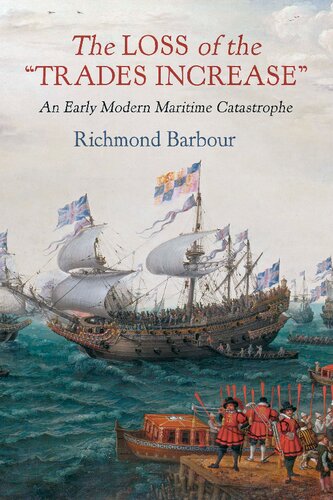

Most ebook files are in PDF format, so you can easily read them using various software such as Foxit Reader or directly on the Google Chrome browser.
Some ebook files are released by publishers in other formats such as .awz, .mobi, .epub, .fb2, etc. You may need to install specific software to read these formats on mobile/PC, such as Calibre.
Please read the tutorial at this link: https://ebookbell.com/faq
We offer FREE conversion to the popular formats you request; however, this may take some time. Therefore, right after payment, please email us, and we will try to provide the service as quickly as possible.
For some exceptional file formats or broken links (if any), please refrain from opening any disputes. Instead, email us first, and we will try to assist within a maximum of 6 hours.
EbookBell Team

4.0
16 reviewsWas it the Titanic of its age?
Christened by an optimistic King James I in December 1609, the Trades Increase was the greatest English merchant vessel of the Jacobean era—a magnificent ship embodying the hopes of the nascent East India Company to claim a commanding share of the Eastern trade. But the ship's launch failed when it proved too large to exit from its dock, an ill-fated start to an expedition that would end some three years later, when a dangerously leaking Trades Increase at last reached the shores of Java. While its smaller companion vessel would sail home with handsome profits for investors, the rotting hull of the great ship itself was beyond repair. The Trades Increase and nearly all who sailed it perished wretchedly on the far side of the world.
The terrible pattern proven by this voyage, with profits to an elite few in London stained by catastrophic losses in equipment and personnel abroad, ignited rancorous controversy in England over the human, moral, and economic costs of such commerce. In The Loss of the "Trades Increase" Richmond Barbour has written an engrossing account of the tragic expedition and of global capitalism at its hour of emergence.
Its sources fragmented among journals, minutes, and letters in the archives of the East India Company, the full story of the Trades Increase is told here for the first time. Earlier writers minimized the loss as a temporary setback and necessary sacrifice on the road to empire. In a work informed by corporate history and postcolonial theory, Barbour sees the saga of the voyage, and all that produced and justified it, differently: as an expression of the structural conflicts, operational risks, and material incapacities that haunted and ultimately unraveled the British Empire—and that destabilize multinational corporations, global markets, and our common biosphere to this day.